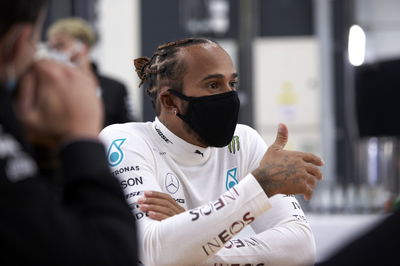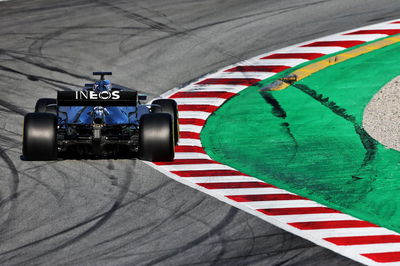Hamilton was not targeting fellow F1 drivers with silence criticism
Mercedes’ Lewis Hamilton says he was not aiming his criticism of people for “staying silent” over racial injustice at his fellow Formula 1 drivers, but rather targeting motorsport as a whole.
Hamilton, who remains the only black driver in F1 history, has championed the sport’s push for change with a number of strong anti-racism messages posted on social media since the killing of George Floyd in the United States, which triggered worldwide protests and demonstrations, including the Black Lives Matter movement.

Mercedes’ Lewis Hamilton says he was not aiming his criticism of people for “staying silent” over racial injustice at his fellow Formula 1 drivers, but rather targeting motorsport as a whole.
Hamilton, who remains the only black driver in F1 history, has championed the sport’s push for change with a number of strong anti-racism messages posted on social media since the killing of George Floyd in the United States, which triggered worldwide protests and demonstrations, including the Black Lives Matter movement.
At the end of May, the six-times F1 world champion described F1 as a “white dominated sport” in a post on his Instagram account. He also included the line: “I see those of you who are staying silent, some of you the biggest stars yet you stay silent in the midst of injustice.”
A wave of messages of support from fellow F1 drivers including the likes of Daniel Ricciardo, Charles Leclerc and Lando Norris followed over the next 24 hours, having seemingly been influenced by Hamilton’s comments.
Speaking in a video for Mercedes parent company Daimler’s new ‘WE CARE WE DO WE MOVE’ initiative, Hamilton explained his motivation behind the message and stressed his fellow drivers were not the target.
"Ultimately, people perceived it as that I was targeting drivers," Hamilton said. "I really wasn't.
“It was targeted at the whole industry. It's been something I've been aware of for a long, long time, and not really seen anyone do anything about it.
"In today's world where we all have a platform to be able to utilise our voice, we all have these followers, our voices are very powerful.
"If you're not a part of trying to encourage people to get out there and understand what this situation is, and why we're in this situation, then for me, that's frustrating.
"People being silent is something I've experienced for such a long time, and it's not the time to be silent. This is a time to help spread the message, to pull together. We need as many voices as we can to promote push for change.
"That was really a calling to people within the industry for accountability, for all the brands. They need to do more. This sport needs to do more. The FIA need to do more.
"We all need to do more. That was really what the message was about.”
Hamilton recently launched The Hamilton Commission, a research initiative in partnership with The Royal Academy of Engineering, with the aim of creating more opportunities to those from minority backgrounds.
Meanwhile, Mercedes has thrown its support behind Hamilton by changing its livery to black and launching a diversity and inclusion programme to address a lack of diversity within its workforce.
“It is a very expensive sport, that’s definitely an underlying factor,” Hamilton added.
“The truth is that the opportunity is not the same, not only from the drivers’ point of view, but with engineers.
“There’s so many great jobs and opportunities within our sport. But the opportunity is not the same for minorities to get through.
“That’s why I put together this commission, to try to understand why that is the case: why they’re not coming through, why they’re not finishing university.
“You can’t change what you don’t know. And I think that’s the issue.
“Lots of people have opinions of why there are no other black drivers, why there are not many people of colour within our sport, but no one truly knows what are the root causes.
“That’s what the goal is with this commission that I’m trying to put together, which is a lot of work, but I really, really hope that it can have a real positive change.”












